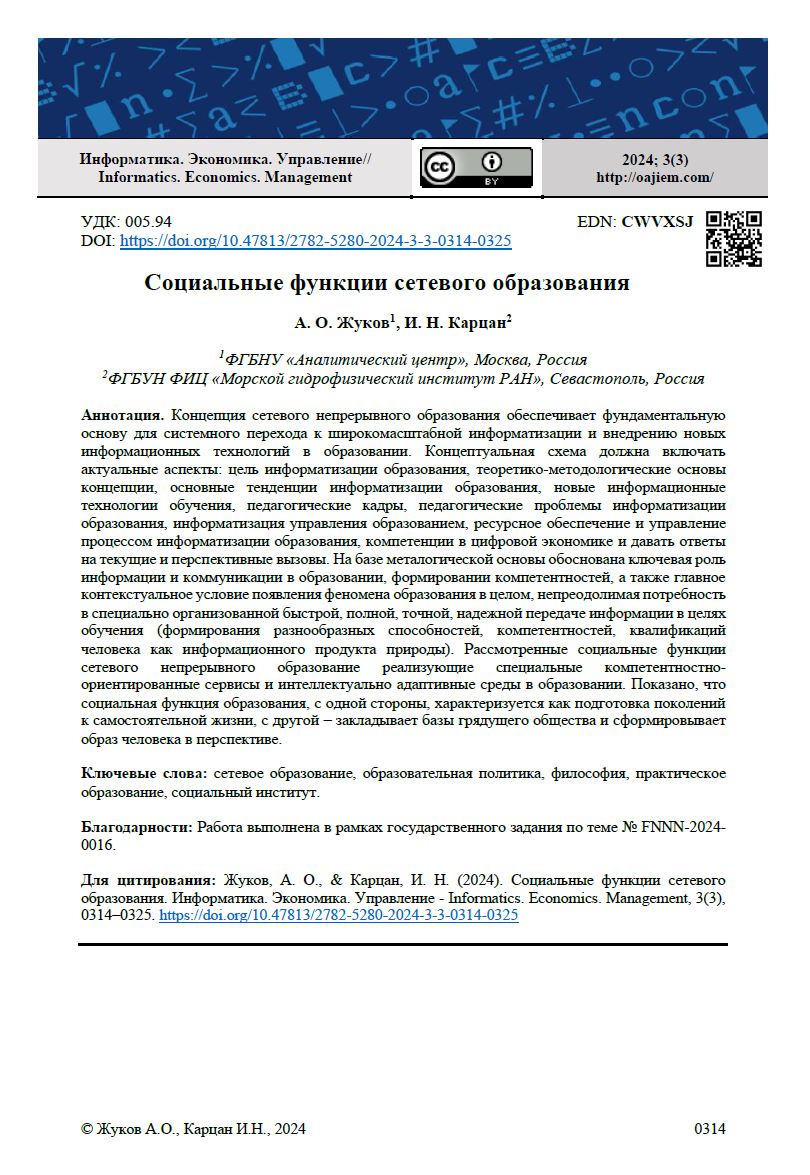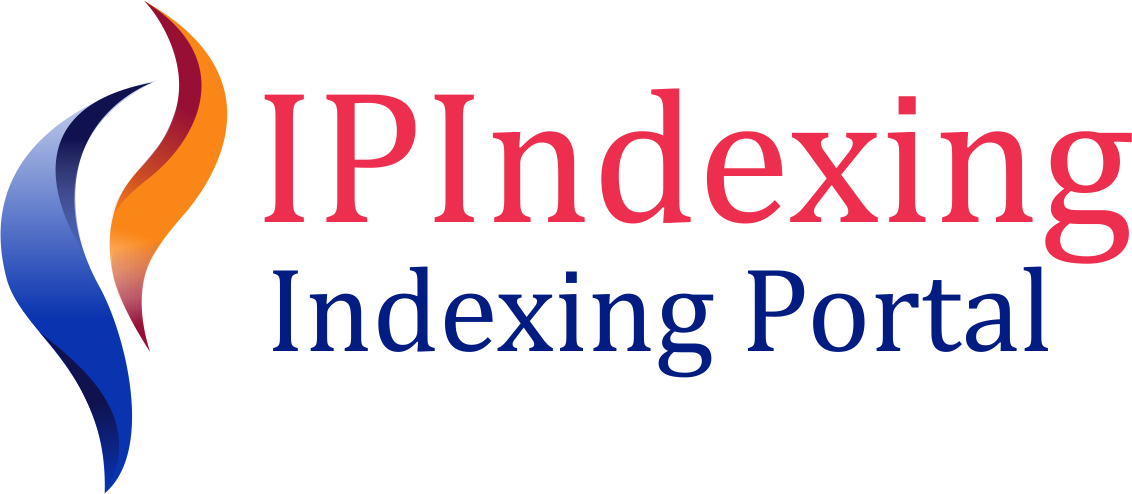Social functions of network education
A. O. Zhukov
https://orcid.org/0000-0002-5122-3752
I. N. Kartsan
https://orcid.org/0000-0003-1833-4036
DOI: https://doi.org/10.47813/2782-5280-2024-3-3-0314-0325
Keywords: network education, educational policy, philosophy, practical education, social institution.
Abstract
The concept of network continuous education provides a fundamental basis for systemic transition to large-scale informatization and introduction of new information technologies in education. The conceptual framework should include relevant aspects: the goal of education informatization, theoretical and methodological foundations of the concept, main trends of education informatization, new information technologies of education, teaching staff, pedagogical problems of education informatization, informatization of education management, resource support and management of the process of education informatization, competencies in the digital economy and provide answers to current and future challenges. On the basis of metalogical basis the key role of information and communication in education, competence formation, as well as the main contextual condition for the emergence of the phenomenon of education in general, the irresistible need for specially organized fast, complete, accurate, reliable transfer of information for learning purposes (formation of various abilities, competences, qualifications of a person as an information product of nature) is substantiated. Considered social functions of network continuous education realizing special competence-oriented services and intellectually adaptive environments in education. It is shown that the social function of education, on the one hand, is characterized as the preparation of generations for independent life, on the other hand, it lays the foundation for the future society and forms the image of man in the future.
Author Biographies
A. O. Zhukov
Aleksander Zhukov,- Dr. Sc., Professor, deputy scientific director, «Analytical Center», Moscow, Russia
I. N. Kartsan
Igor Kartsan, Dr. Sc., Docent, Leading Researcher, Marine Hydrophysical Institute, Russian Academy of Sciences, Sevastopol, Russia
References
Авлиякулов А.К., Ходжаев Н.С. Инновационный подход к организации учебного процесса в профессиональном образовательном учреждении. Просвещение и познание. 2021; 4 (4): 65-74.
Коржавина Т.Н. Подготовка преподавателей к компетенциям цифровой экономики для организаций среднего профессионального образования. Вестник Южно-Уральского государственного гуманитарно-педагогического университета. 2022; 1 (167): 111-129. DOI: 10.25588/CSPU.2022.167.1.007
Kartsan I., Zhukov A., Pronichkin S. Conceptual model of sustainable human capital development in the context of digitalization of the environment. E3S Web of Conferences. Ural Environmental Science Forum «Sustainable Development of Industrial Region» (UESF-2023). Chelyabinsk. 2023; 09056. https://doi.org/10.1051/e3sconf/202338909056
Зайцева О.М., Новикова Т.Р. Сетевая форма обучения как способ реализации индивидуальной образовательной траектории студента. Актуальные вопросы современной экономики. 2019; 5: 301-311. DOI: 10.34755/IROK.2019.5.5.069
Kartsan I., Kartsan P., Matyunina M., Zhukov A., Kolosov A. Economic mechanisms of environmental protection. E3S Web of Conferences. EBWFF 2023 - International Scientific Conference Ecological and Biological Well-Being of Flora and Fauna (Part 1). 2023; 08008. https://doi.org/10.1051/e3sconf/202342008008
Кузнецова Т.Я. Сетевое взаимодействие как базовый фактор инновационного развития библиотечного образования. Научные и технические библиотеки. 2018; 4: 84-97.
Arcidiacono P., Hotz J., Kang S. Modeling college major choices using elicited measures of expectations and counterfactuals. Journal of Econometrics. Amsterdam, Elsevier. 2012; 166: 3-16. https://doi.org/10.1016/j.jeconom.2011.06.002
Трубина Г.Ф. Цифровизация как способ снижения возможности отклоняющегося поведения в высшем образовании. Умная цифровая экономика. 2022; 2 (2): 95-104.
Kartsan I., Zhukov A., Pronichkin S. Models and algorithms for human capital reproduction intellectual analysis. E3S Web of Conferences. International Scientific and Practical Conference «Environmental Risks and Safety in Mechanical Engineering» (ERSME-2023). Rostov-on-Don, 2023; 05013. https://doi.org/10.1051/e3sconf/202337605013
Mangset M., Maxwell C., Van Zanten A. Knowledge, skills and dispositions: The socialisation and ‘training’ of elites. Journal of Education and Work. 2017; 2 (30): 123-128. https://doi.org/10.1080/13639080.2017.1278902
Зинковский М.А. Цифровые технологии в высшем образовании как фактор развития цифровой экономики. Право и образование. 2022; 11: 11-17.
Kartsan I., Zhukov A., Pronichkin S., Gedzyun V., Bondareva M. Economic and mathematical modeling of demand subsidies for photovoltaic technologies. E3S Web of Conferences. 2023; 03006. https://doi.org/10.1051/e3sconf/202346003006
Скрипкин К.Г. От информационных технологий в учебном процессе к новой модели образования. Современные информационные технологии и ИТ-образование. 2013; 9: 812-822.
Балык А.С., Семкина Е.Н. Обучение посредством дистанционных образовательных технологий как форма организации учебного процесса в вузе. Образование личности. 2021; 3-4: 21-29.
Писарева С.А., Тряпицына А.П. Методологические аспекты перехода к новой организации образовательного процесса. Известия Саратовского университета. Новая серия. Серия: Акмеология образования. Психология развития. 2020; 9-3 (35): 281-288. https://doi.org/10.18500/2304-9790-2020-9-3-281-288
Берулава Г.А., Берулава М.Н. Теория сетевого образования как новая методологическая платформа высшего образования. Гуманизация образования. 2012; 4: 8-19.
Khashirova T.Y., Mamuchiev I.I., Mamuchieva M.I., Ozhiganova M.I., Kostyukov A.D., Shumeiko I. Assessment of information security in integrated systems. В сборнике: Proceedings of the 2021 IEEE International Conference "Quality Management, Transport and Information Security, Information Technologies", T and QM and IS 2021. 2021; 201-205. https://doi.org/10.1109/ITQMIS53292.2021.9642824
Shomakhov Z.V., Apekov A.M., Dyshekova A.Kh., Beshaliev M.Kh., Ksenofontov A.S., Arvanova S.M., Karmokov A.M., Ozhiganova M.I. Analysis of carbon nanomaterials produced by the electric arc methods. Nano Hybrids and Composites. 2020; 28: 136-145. https://doi.org/10.4028/www.scientific.net/NHC.28.136
REFERENCES
Avliyakulov A.K., Hodzhaev N.S. Innovacionnyj podhod k organizacii uchebnogo processa v professional'nom obrazovatel'nom uchrezhdenii. Prosveshchenie i poznanie. 2021; 4 (4): 65-74. (in Russian)
Korzhavina T.N. Podgotovka prepodavatelej k kompetenciyam cifrovoj ekonomiki dlya organizacij srednego professional'nogo obrazovaniya. Vestnik YUzhno-Ural'skogo gosudarstvennogo gumanitarno-pedagogicheskogo universiteta. 2022; 1 (167): 111-129. DOI: 10.25588/CSPU.2022.167.1.007 (in Russian)
Kartsan I., Zhukov A., Pronichkin S. Conceptual model of sustainable human capital development in the context of digitalization of the environment. E3S Web of Conferences. Ural Environmental Science Forum «Sustainable Development of Industrial Region» (UESF-2023). Chelyabinsk. 2023; 09056. https://doi.org/10.1051/e3sconf/202338909056 DOI: https://doi.org/10.1051/e3sconf/202338909056
Zajceva O.M., Novikova T.R. Setevaya forma obucheniya kak sposob realizacii individual'noj obrazovatel'noj traektorii studenta. Aktual'nye voprosy sovremennoj ekonomiki. 2019; 5: 301-311. DOI: 10.34755/IROK.2019.5.5.069 (in Russian)
Kartsan I., Kartsan P., Matyunina M., Zhukov A., Kolosov A. Economic mechanisms of environmental protection. E3S Web of Conferences. EBWFF 2023 - International Scientific Conference Ecological and Biological Well-Being of Flora and Fauna (Part 1). 2023; 08008. https://doi.org/10.1051/e3sconf/202342008008 DOI: https://doi.org/10.1051/e3sconf/202342008008
Kuznecova T.YA. Setevoe vzaimodejstvie kak bazovyj faktor innovacionnogo razvitiya bibliotechnogo obrazovaniya. Nauchnye i tekhnicheskie biblioteki. 2018; 4: 84-97. (in Russian)
Arcidiacono P., Hotz J., Kang S. Modeling college major choices using elicited measures of expectations and counterfactuals. Journal of Econometrics. Amsterdam, Elsevier. 2012; 166: 3-16. https://doi.org/10.1016/j.jeconom.2011.06.002 DOI: https://doi.org/10.1016/j.jeconom.2011.06.002
Trubina G.F. Cifrovizaciya kak sposob snizheniya vozmozhnosti otklonyayushchegosya povedeniya v vysshem obrazovanii. Umnaya cifrovaya ekonomika. 2022; 2 (2): 95-104. (in Russian)
Kartsan I., Zhukov A., Pronichkin S. Models and algorithms for human capital reproduction intellectual analysis. E3S Web of Conferences. International Scientific and Practical Conference «Environmental Risks and Safety in Mechanical Engineering» (ERSME-2023). Rostov-on-Don, 2023; 05013. https://doi.org/10.1051/e3sconf/202337605013 DOI: https://doi.org/10.1051/e3sconf/202337605013
Mangset M., Maxwell C., Van Zanten A. Knowledge, skills and dispositions: The socialisation and ‘training’ of elites. Journal of Education and Work. 2017; 2 (30): 123-128. https://doi.org/10.1080/13639080.2017.1278902 DOI: https://doi.org/10.1080/13639080.2017.1278902
Zinkovskij M.A. Cifrovye tekhnologii v vysshem obrazovanii kak faktor razvitiya cifrovoj ekonomiki. Pravo i obrazovanie. 2022; 11: 11-17. (in Russian)
Kartsan I., Zhukov A., Pronichkin S., Gedzyun V., Bondareva M. Economic and mathematical modeling of demand subsidies for photovoltaic technologies. E3S Web of Conferences. 2023; 03006. https://doi.org/10.1051/e3sconf/202346003006 DOI: https://doi.org/10.1051/e3sconf/202346003006
Skripkin K.G. Ot informacionnyh tekhnologij v uchebnom processe k novoj modeli obrazovaniya. Sovremennye informacionnye tekhnologii i IT-obrazovanie. 2013; 9: 812-822. (in Russian)
Balyk A.S., Semkina E.N. Obuchenie posredstvom distancionnyh obrazovatel'nyh tekhnologij kak forma organizacii uchebnogo processa v vuze. Obrazovanie lichnosti. 2021; 3-4: 21-29. (in Russian)
Pisareva S.A., Tryapicyna A.P. Metodologicheskie aspekty perekhoda k novoj organizacii obrazovatel'nogo processa. Izvestiya Saratovskogo universiteta. Novaya seriya. Seriya: Akmeologiya obrazovaniya. Psihologiya razvitiya. 2020; 9-3 (35): 281-288. https://doi.org/10.18500/2304-9790-2020-9-3-281-288 (in Russian) DOI: https://doi.org/10.18500/2304-9790-2020-9-3-281-288
Berulava G.A., Berulava M.N. Teoriya setevogo obrazovaniya kak novaya metodologicheskaya platforma vysshego obrazovaniya. Gumanizaciya obrazovaniya. 2012; 4: 8-19. (in Russian)
Khashirova T.Y., Mamuchiev I.I., Mamuchieva M.I., Ozhiganova M.I., Kostyukov A.D., Shumeiko I. Assessment of information security in integrated systems. V sbornike: Proceedings of the 2021 IEEE International Conference "Quality Management, Transport and Information Security, Information Technologies", T and QM and IS 2021. 2021; 201-205. https://doi.org/10.1109/ITQMIS53292.2021.9642824 DOI: https://doi.org/10.1109/ITQMIS53292.2021.9642824
Shomakhov Z.V., Apekov A.M., Dyshekova A.Kh., Beshaliev M.Kh., Ksenofontov A.S., Arvanova S.M., Karmokov A.M., Ozhiganova M.I. Analysis of carbon nanomaterials produced by the electric arc methods. Nano Hybrids and Composites. 2020; 28: 136-145. https://doi.org/10.4028/www.scientific.net/NHC.28.136 DOI: https://doi.org/10.4028/www.scientific.net/NHC.28.136
















